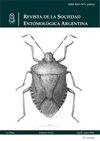Preliminary report of the toxicity of Lippia junelliana (Lamiales: Verbenaceae) and Elionorus muticus (Poales: Poaceae) on Apis mellifera (Hymenoptera: Apidae)
IF 0.5
4区 农林科学
Q4 ENTOMOLOGY
引用次数: 0
Abstract
Several phytochemicals, such as extracts and essential oils, are among the ecological alternatives that have been studied for the control of pathogens that affect humans, animals, and plants. Essential oils are aromatic oily liquids obtained from plant material and their use to control pathogens is widespread. However, they can have adverse effects when taken in high concentrations. The aim of this study was to evaluate the survival and palatability of a balanced-energy protein diet with the addition of two essential oils, Lippia junelliana (Mold.) Tronc. and Elionorus muticus (Spreng.) Kuntze, in newly hatched worker bees (Apis mellifera L.) during a period of 15 days. Consumption and number of live bees were measured daily for each treatment. For L. junelliana, our results showed a non-toxic trend in long-term survival trials (15 days) at low concentrations. In the case of E. muticus, a toxic effect with low survival was observed at all concentrations. Both essential oils showed good palatability, even at toxic levels. Our results allow us to propose the use of L. junelliana essential oil in field experiments of A. mellifera hives.junelliana李皮(Lamiales:马鞭草科)和Elionorus muticus(Poales:Poaceae)对蜜蜂(膜翅目:Apidae)毒性的初步报告
一些植物化学物质,如提取物和精油,是已经研究的用于控制影响人类、动物和植物的病原体的生态替代品。精油是从植物材料中提取的芳香油状液体,它们被广泛用于控制病原体。然而,如果服用浓度过高,它们可能会产生不良影响。本研究的目的是评估在平衡能量蛋白质饮食中添加两种精油的存活率和适口性。Tronc。和Elionorus muticus(春天)在刚孵出的工蜂(Apis mellifera L.)的15天内。每天对每次处理的蜜蜂消耗量和活蜂数量进行测量。对于junelliana,我们的结果显示在低浓度的长期生存试验(15天)中无毒趋势。在所有浓度下,均观察到muticus的毒性作用和低存活率。两种精油都显示出良好的适口性,即使在有毒的水平。我们的研究结果允许我们提出在蜜蜂蜂巢的田间实验中使用朱莉花精油。
本文章由计算机程序翻译,如有差异,请以英文原文为准。
求助全文
约1分钟内获得全文
求助全文
来源期刊

Revista De La Sociedad Entomologica Argentina
Agricultural and Biological Sciences-Insect Science
CiteScore
0.80
自引率
20.00%
发文量
31
审稿时长
20 weeks
 求助内容:
求助内容: 应助结果提醒方式:
应助结果提醒方式:


